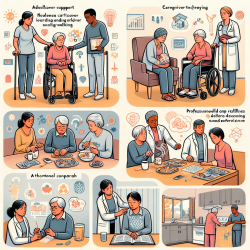Introduction
In the quest for healthier aging, understanding the factors that influence perceived health in late life is crucial. A fascinating study titled "Childhood Environment as a Predictor of Perceived Health Status in Late Life" sheds light on the significant role childhood environment plays in shaping health perceptions decades later. This blog delves into the study's findings and explores how practitioners can leverage this knowledge to enhance their practice.
The Power of Childhood Environment
The study, conducted over seven decades, reveals that the quality of one's childhood environment is a strong predictor of perceived health in late life. It highlights that childhood experiences contribute uniquely to health perceptions, beyond personality traits and objective health measures. This insight is pivotal for practitioners aiming to understand the long-term impacts of early life experiences on their clients' health perceptions.
Key Findings
- Longitudinal Impact: The study tracked participants from late adolescence into old age, providing robust data on how childhood environment influences health perceptions over time.
- Independent Predictor: Childhood environment consistently predicted perceived health at ages 63, 73, and 78, even when controlling for objective health and neuroticism.
- Mechanisms of Influence: Positive childhood environments may foster psychological traits like optimism and self-control, enhancing health perceptions in adulthood.
Implications for Practitioners
Practitioners can harness these findings to improve their therapeutic approaches. By understanding the long-term impact of childhood environments, they can tailor interventions to address the root causes of negative health perceptions. Here are some actionable steps:
- Comprehensive Assessments: Incorporate questions about childhood experiences in assessments to gain a holistic view of clients' health perceptions.
- Targeted Interventions: Develop interventions that focus on building positive psychological traits, such as resilience and optimism, that may have been underdeveloped due to adverse childhood environments.
- Educational Workshops: Organize workshops for parents and caregivers to highlight the importance of nurturing environments for long-term health benefits.
Encouraging Further Research
While this study provides valuable insights, it also underscores the need for further research. Practitioners are encouraged to explore additional factors that may mediate the relationship between childhood environment and perceived health. Understanding these mechanisms can lead to more effective interventions and improved health outcomes for clients.
Conclusion
The study "Childhood Environment as a Predictor of Perceived Health Status in Late Life" offers compelling evidence of the long-lasting impact of early life experiences on health perceptions. By integrating these findings into practice, practitioners can enhance their therapeutic approaches and contribute to healthier aging for their clients.
To read the original research paper, please follow this link: Childhood Environment as a Predictor of Perceived Health Status in Late Life.










